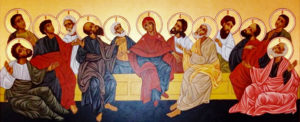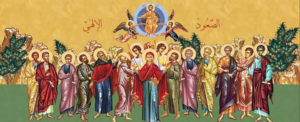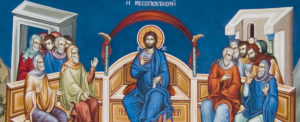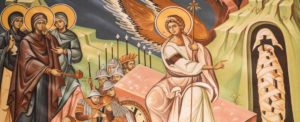The third Sunday of Holy Pascha is observed by the Orthodox Church as the Sunday of the Holy Myrrh-Bearers. The day commemorates when the women disciples of the Lord came to the tomb to anoint his body with myrrh-oils but found the tomb empty. As the woman wondered what this meant, angels appeared proclaiming that Christ had risen from the dead.
About the beginning of His thirty-second year, when the Lord Jesus was going throughout Galilee, preaching and working miracles, many women who had received of His beneficence left their own homeland and from then on followed after Him. They ministered unto Him out of their own possessions, even until His crucifixion and entombment; and afterwards, neither losing faith in Him after His death, nor fearing the wrath of the Jewish rulers, they came to His sepulcher, bearing the myrrh-oils they had prepared to anoint His body. It is because of the myrrh-oils that these God-loving women brought to the tomb of Jesus that they are called Myrrh-bearers.
Of those whose names are known are the following: first of all, the most holy Virgin Mary, who in Matthew 27:56 and Mark 15:40 is called “the mother of James and Joses” (these are the sons of Joseph by a previous marriage, and she was therefore their step-mother); Mary Magdalene (celebrated July 22); Mary, the wife of Clopas; Joanna, wife of Chouza, a steward of Herod Antipas; Salome, the mother of the sons of Zebedee; Mary and Martha, the sisters of Lazarus; and Susanna. As for the names of the rest of them, the evangelists have kept silence (Matthew 217:55-56; 28:1-10. Mark 15:40-41; Luke 8:1-3; 23:55-24:11, 22-24. John 19:25; 20:11-18. Acts 1:14.)
Together with them we celebrate also the secret disciples of the Savior, Joseph and Nicodemus. Of these, Nicodemus was a Jerusalemite, a prominent leader among the Jews and of the order of the Pharisees, learned in the Law and instructed in the Holy Scriptures. He had believed in Christ when, at the beginning of our Savior’s preaching of salvation, he came to Him by night. Furthermore, he brought some one hundred pounds of myrrh-oils and an aromatic mixture of aloes and spices out of reverence for the divine Teacher (John 19:39). Joseph, who was from the city of Arimathea, was a wealthy and noble man, and one of the counselors who were in Jerusalem. He went bodly unto Pilate and asked for the body of Jesus, and together with Nicodemus he gave Him burial. Since time did not permit the preparation of another tomb, he placed the Lord’s body in his own tomb which was hewn out of rock, as the Evangelist says (Matthew 27:60).
Troparion, Tone 2
The noble Joseph, taking Thine immaculate Body down from the Tree, and having wrapped It in pure linen and spices, laid It in a new tomb. But on the third day Thou didst arise, O Lord, granting to the world great mercy.
Kontakion, Tone 2
When Thou didst cry, Rejoice, unto the myrrh-bearers, Thou didst make the lamentation of Eve the first mother to cease by Thy Resurrection, O Christ God. And Thou didst bid Thine apostles to preach: The Savior is risen from the grave.






